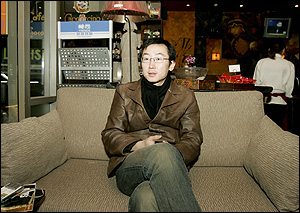|
Global Anxiety
part 1 2 3
Hollywood films are popular in China. A cinema not far from Tiananmen Square, yes, has those seats you can fold out into sofas. It's screening the latest Nicholas Cage movie, National Treasure, overdubbed in Mandarin. But young Chinese also watch films from their own country, and from Europe, Japan, and elsewhere.
At a DVD store in Beijing, Huang Shan, a 19-year-old student at the International Economic and Trade University, flips through the stacks of discs for sale.
"Oh, this is a Korean film, called You Have to Believe in Fate," says Huang. "This is the most popular Korean film in China in 2004, after the film My Sassy Girl. It is very popular among young people in China because of its romantic and beautiful scenes. ... Almost 90 percent of the students in my university have seen this film."
Huang says things have changed a lot since she was a small child in a rural village. Then, she says, Chinese films were the only kind allowed. They were shown once in awhile on an outdoor screen. Now the world's movies are readily accessible, though often on pirated DVDs. Some recent Chinese films have had box-office success, at home, and in the West, especially martial arts pictures like "House of Flying Daggers" and "Kung Fu Hustle."
 | Chinese director Lu Chuan
GOH CHAI HIN/AFP/Getty Images |
"I feel very sad that only kung fu films show in the United States. But I try to change the situation," says Lu Chuan, a young Chinese director. His latest film, "Kekexili: Mountain Patrol," tells a story about deer poachers in the high mountains of Tibet. The film has been shown at festivals from Tokyo and Taiwan, to Berlin and Sundance. Lu says his film was one of 260 made in China last year.
"The Chinese industry produce more and more films because more and more money rolling in and more and more young directors got their first chance to make a movie," says Chuan.
Lu says he's been influenced by Japanese, European, and American directors. He cites Coppola and Scorsese. He sees himself as a Chinese artist, drawing lessons from the best filmmakers wherever they are.
"For maybe fifty years," says Lu, "China didn't open their door to learn to bring the good things from outside. 'It's bad, it's not good.' But now the door is open and you will never shut. … I think, first, we should learn from Japanese movie, especially we should learn from American movie. … We should learn everything. Then, second, we should make Chinese movie."
|











